A group of House Republicans, spearheaded by Representatives Tim Walberg (R-MI) and Andrew Clyde (R-GA), have introduced the Choice in Automobile Retail Sales (CARS) Act. This legislation aims to prevent the Environmental Protection Agency (EPA) from enforcing proposed tailpipe emission standards designed to promote electric vehicle (EV) adoption.
Walberg argues that the Biden administration's regulations restrict consumer choice, increase vehicle prices, and negatively impact American auto industry jobs. He believes the CARS Act will empower consumers to choose vehicles that suit their needs and protect automakers from unrealistic mandates driven by what he calls the President's Green New Deal agenda.

The EPA's proposed regulations, unveiled in April, are the most stringent ever. Projections indicate that if implemented, they could lead to a significant increase in electric vehicle purchases across various vehicle categories by 2032.
Beyond blocking these specific regulations, the CARS Act would also prevent any regulations mandating specific technologies or limiting vehicle availability based on engine type. It would also compel the EPA to update any existing regulations that limit new vehicles based on engine type.
Clyde criticizes the Biden administration's energy policies, viewing them as attempts to increase government control. He expresses concern about the financial burden of expensive EVs on American families, particularly given rising energy prices and inflation, and the potential benefit to China, a major player in the EV market.

Critics of the proposed emissions rules, including Republicans and energy experts, contend that EVs are expensive, less efficient, and reliant on Chinese supply chains. Data from Kelley Blue Book shows a significant price difference between EVs and traditional gasoline vehicles. The Department of Energy also highlights the disparity in driving range between the two vehicle types.
Numerous other Representatives have joined as co-sponsors of the CARS Act.
Comments(0)
Top Comments